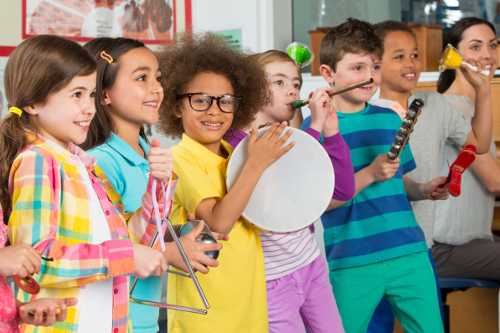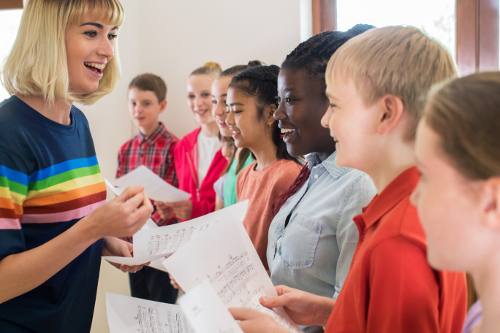"Students engaged in group work, or cooperative learning, show increased individual achievement compared to students working alone."1
- When are groups more fun?
- When are groups better than private lessons?
- When are groups a bad choice?
- What about dance?
- See descriptions of all instrumental group options
So groups are great. They are less expensive and more fun, but what group options are available?
We have so many group types that the instrumental and vocal group options have their own pages, but read on to find when groups are fun, better or even bad!

Interactive Book to explore a path to Instrumental learning
Interactive Book to explore a path to Vocal learning
When are groups more fun?
When they are for exploration, surveys, and performance. Learn about group instrumental learning.
Learning music with others allows peer-peer interactions, develops confidence, cooperation and leadership and inspires us to emulate what we see and hear other doing or playing. But most of all it is fun! Fun to hear and see others, fun to collaborate, fun to learn by team games, and let's face it, without focus on just me, it is more fun to be free to make mistakes, because sometimes I see others making them too!
Performing music together teaches teamwork, builds listening and cooperative skills and creates harmonies (musical and otherwise) that cannot be achieved alone. This is inspiring and also helps me want to keep learning and growing! View our current Group Class Schedule!
What type of group experience is even better than private lessons!
Singing groups are usually even more effective than private vocal lessons. Why? Because everyone learns to sing in the same way, regardless of learning style and also because blending sounds and singing harmony is impossible alone. Unlike vocal learning where the basics of breathing, articulation and performance are the focus, instrumental learning also requires much more...
...attention to specific technique (i.e., pressure of the bow on the string, eye-hand coordination, shape of the hands, placement of fingers on the keys etc.) and in most cases, much more visual processing for the reading of music-- and in the case of non-wind instruments, often requires reading and playing several notes at the same time. Learn about vocal group and private options.
Sometimes groups are a bad choice.
When the goal is to receive a general overview or to perform together, then groups are a great option. It can be fabulously fun to survey or even learn the basics of an instrument with others where I can experience positive synergy and everyone is learning the same things in the same way, Once I understand the basic geography and techniques, my need to address my own weaker areas and develop specific skills is impossible to meet in a group setting-- at least in a way that moves fast enought to inspire strong progress.
In a private lesson, where I can receive the individualized help that addresses my learning style and approaches my specfic areas of growth, I thrive! Learning quickly-- making my music sound better-- is a key ingredient to stay excited on the journey. Remember, it needs to be fun enough to inspire me to keep moving toward the finish line. (We call this "Phase 3".) Learn more about our 3-phase pathway to excellence.
Groups are a bad choice when the goal is to develop skills because in a group, I cannot do that fast enough to keep me inspired to learn.
Okay! I'm sold. What are the group vocal and instrumental class links?
There you go! Try something. Get on the path! Have fun! Even adults can get to the finish line.
1. The Washington University Center for Teaching and Learning






